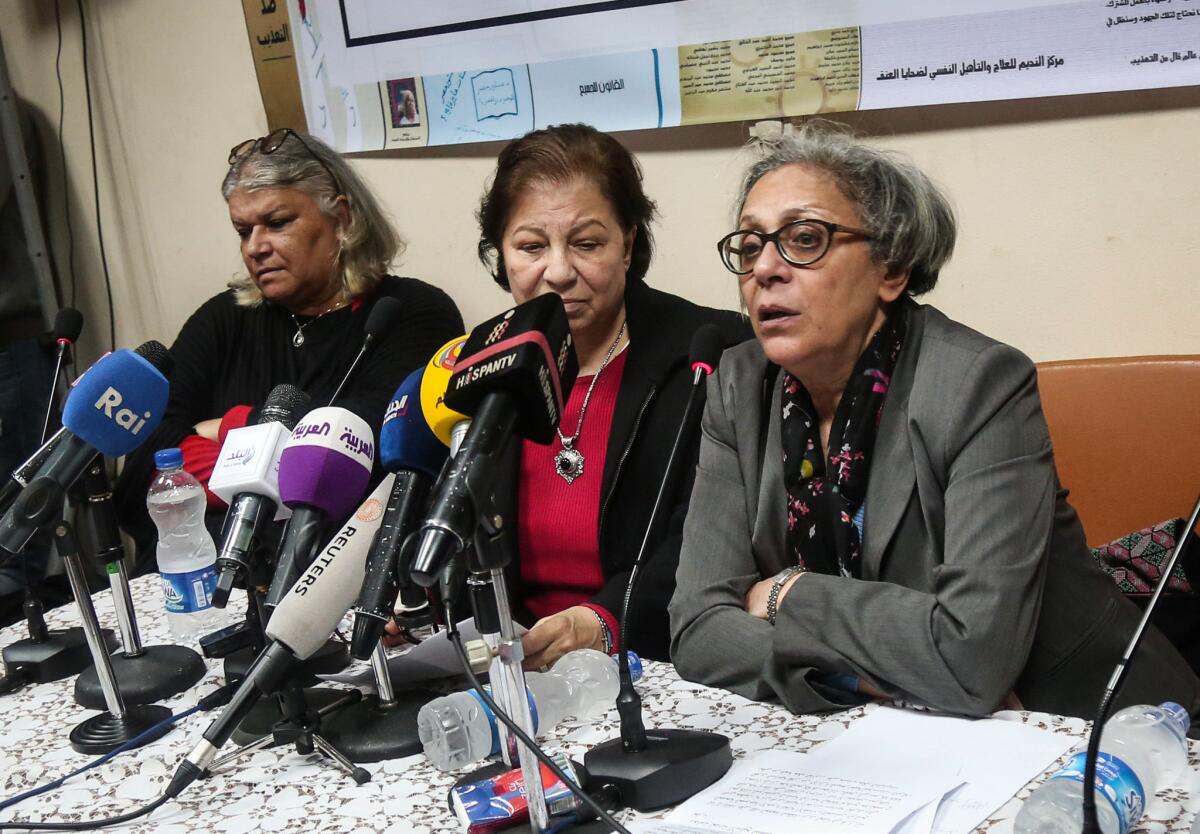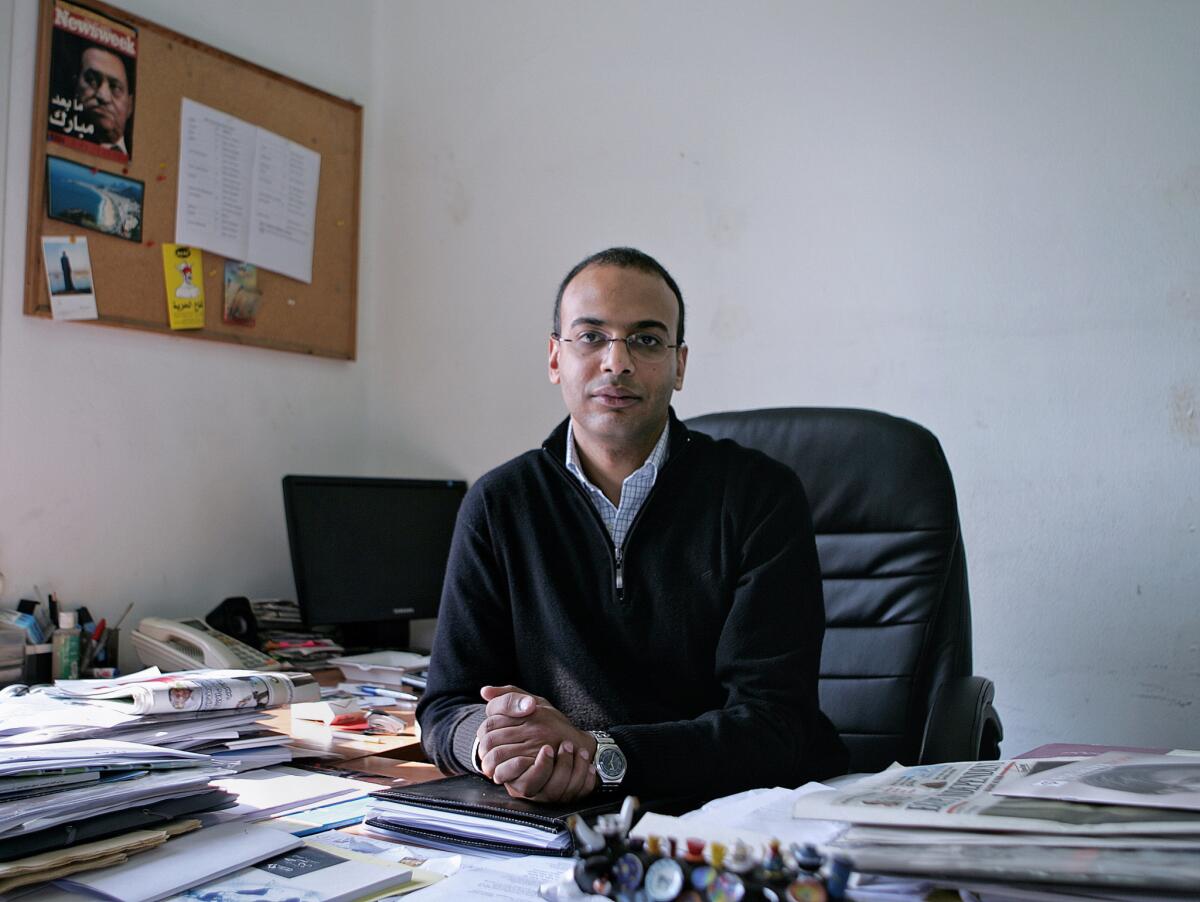This group stood up to Egypt’s crackdown on human rights organizations

Aida Seif Dawla, from left, Suzan Fayyad and Magda Adly of the El Nadeem Center for Rehabilitation of Victims of Violence, speak at a Cairo news conference after the government attempted to shut down the center on Feb. 21, 2016.
Reporting from Cairo — Egypt expanded its crackdown on human rights organizations Tuesday, raiding a center that treats victims of violence and attempting to shut it down.
This time, however, the government backed down, retreating from the El Nadeem Center for Rehabilitation of Victims of Violence after staff members refused to comply with orders to leave. It was a rare, and perhaps fleeting, victory by a nongovernmental organization in a standoff with the government of President Abdel Fattah Sisi.
According to Magda Adly, a cofounder of El Nadeem, Health Ministry officials said they intended to close the center because it was conducting activities beyond its mandate without obtaining the required licensing.
El Nadeem runs a clinic that treats victims of abuse, especially those who were tortured or otherwise mistreated in police custody. The raid was the second in less than two months, after a police delegation stormed the center with the same aim on Feb. 17.
These investigations have no legal basis whatsoever .... We are facing a case of targeting of independent rights institutions.
— Gamal Eid, director of the Arab Network for Human Rights Information
“The center is only carrying out medical duties, which El Nadeem is licensed to practice by the Ministry of Health .... There is a clear intention to shut up any voice of dissent,” Adly said in an interview with The Times.
“It’s not only us, but there is a considerable number of journalists who are being arrested, as well as rights activists and independent trade unionists,” she added.
With thousands of people jailed on politically based charges and accusations since the overthrow of former President Mohamed Morsi in 2013, Egyptian and international rights advocates are bemoaning the country’s human rights record under Sisi.
A report issued by El Nadeem in January said that 474 people had died in police custody in 2015. Another report issued by the Egyptian Commission for Rights and Freedoms documented 340 cases of enforced disappearances between August and November.
While acknowledging cases of disappearances, Egypt’s Interior Ministry disputed that figure.
A joint statement issued by 17 Egyptian rights organizations on March 21 condemned what it called the “orchestrated and escalating assault against Egyptian civil society.”
The statement highlighted an investigation against a number of human rights organizations and their staff members, who are facing accusations of illegal foreign funding.

Hossam Bahgat, cofounder of the Egyptian Initiative for Personal Rights, shown in 2011, has been barred from traveling and had his personal assets frozen as part of a crackdown by Egypt on human rights organizations.
Hossam Bahgat, founder of the Egyptian Initiative for Personal Rights, and Gamal Eid, director of the Arab Network for Human Rights Information, have both been questioned, barred from traveling and had their personal assets frozen.
“These investigations have no legal basis whatsoever.... They are held upon the orders of security [authorities] and not upon existing laws,” Eid said in an interview.
“We are facing a case of targeting of independent rights institutions,” he added.
If indicted, Eid, Bahgat and other advocates could face life sentences under an amendment to the “foreign funding” law, instituted by Sisi in September 2014.
Investigating judges say that their probe is “fully independent” from political authorities.
Hassan is a special correspondent.
MORE FROM WORLD
Syrian rebels have long wanted anti-aircraft missiles. Their wish may have been granted
These women in Turkey saw the need for a different kind of news, despite the danger
Why you probably didn’t hear everyone talking about these major terror attacks
More to Read
Sign up for Essential California
The most important California stories and recommendations in your inbox every morning.
You may occasionally receive promotional content from the Los Angeles Times.










